ADB lending $920 million to Philippines in 2018

CLARK FREEPORT, Pampanga , Philippines — The Asian Development Bank (ADB) said yesterday its sovereign loan to the Philippines is expected to reach $920 million this year and “a new record high” of about $1.4 billion in 2019.
In a report distributed to participants in its annual meeting here, the ADB identified the projects to be funded by the loans being readied for approval this year.
Of the amount, $300 million would be for “expanding private participation in infrastructure program, sub-program 2.”
The program “will support the implementation of public-private partnership regulations and procedures, including those arising from eventual adoption of amendments to the Build-Operate-Transfer law,” the report said.
Another $300 million would be for “inclusive development programs” to “support government efforts to bring more poor families into the financial system. It will support the implementation of new and innovative ways for the delivery and increase usage of non-credit financial products and services, access to housing finance, and financial literacy for the poor.”
The report also said $100 million would be for project to “reinforce recent ADB initiatives in the South-Central Mindanao Development Corridor that support medium to long-term capacity development of local government units.”
Another $100 million would be for easing Metro Manila’s “chronic traffic congestion problems,” by upgrading system management and addressing new infrastructure requirements.
ADB also said $70 million would be for the development of “a modern, efficient, and affordable public transport system” in Davao City.
“The urban public transport system will have a broader network coverage, more suitable vehicle types, simplified and integrated route networks, unified operating systems, enhanced planning and regulatory environment and improved physical infrastructure,” ADB said in its report.
Some $50 million would be for “long-term capacity building project to foster a culture of competition in government,” it added.
Meanwhile, on the sidelines of the ADB meeting, Finance Secretary Carlos Dominguez III said there would be no more special tax privilege for investors in the country’s special economic zones and free ports under Package 2 of the Tax Reform for Acceleration and Inclusion (TRAIN) law.
Taxes paid by investors at eco-zones currently represent only five percent of their gross income. Under Package 2 of TRAIN, investors – regardless of whether they are at eco-zones – would be required to pay 25 percent of net taxable income instead of the current 30 percent.
“We have to modernize and make incentives more relevant to attract new industries. The work atmosphere is changing with new industries such as robotics and data analytics. Artificial intelligence is poised to take over lower end outsourcing services,” Dominguez later told The STAR.
Asked what would happen to free ports and economic zones after the implementation of Package 2, Transportation Secretary Arthur Tugade said, “I don’t know.” Tugade had served as chief executive officer of Clark Development Corp.
- Latest
- Trending


























